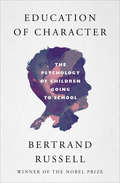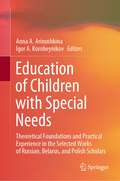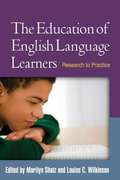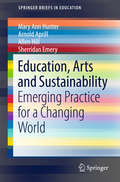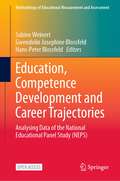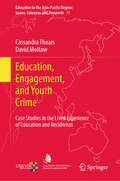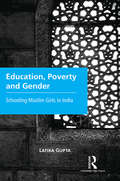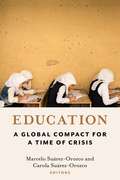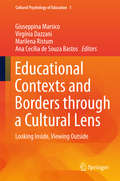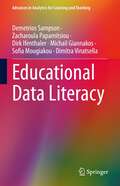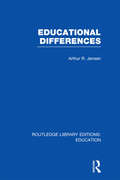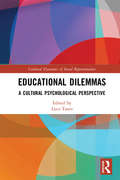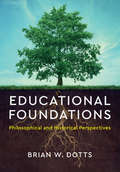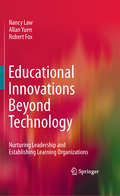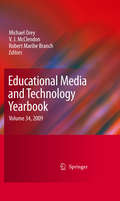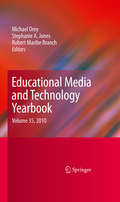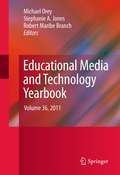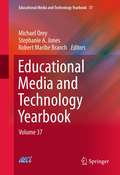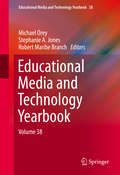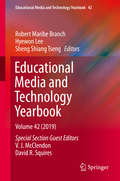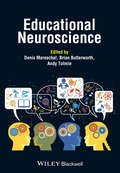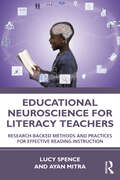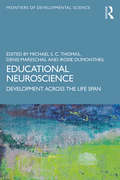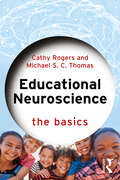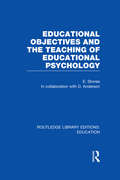- Table View
- List View
Education of Character: The Psychology of Children Going to School
by Bertrand RussellThe Nobel Prize winner explores the role of early childhood education in building personal character. In Education of Character, great twentieth-century philosopher Bertrand Russell goes beyond math or history and into the larger purposes of education. What do we want our children to be like as people? What kind of future community do we want to build? And what approaches are most likely to achieve the results we want? Taking the discoveries of modern psychology into account, Russell notes that habits of mind are formed earlier than we may realize and represent a crucial part of children&’s ability to cope successfully with challenges as they grow older. Beginning with the very first year of life and giving consideration to both home and classroom, Russell discusses such topics as fear, play, selfishness, sympathy, and truthfulness—offering parents and other caregivers a set of guiding principles that can help them develop virtue and good character in youngsters.
Education of Children with Special Needs: Theoretical Foundations and Practical Experience in the Selected Works of Russian, Belarus, and Polish Scholars
by Anna A. Arinushkina Igor A. KorobeynikovThis book presents for the first time the results of scientific research in the field of special education and special psychology carried out by top experts of the Russian Federation and the Republic of Belarus. The range of problems discussed in the book reflects the most relevant areas of development of the education system and psychological and pedagogical assistance to children with special educational needs (SEN). Both scientific and methodological developments provide practitioners with modern means of diagnostic, correctional, developmental, and preventive work. Furthermore, responding to the current challenges, the authors present the results of research on the impact of virtual reality on the health of adolescents, the results of an experiment on the study and formation of financial literacy of high-school kids with developmental disorders, highlight approaches to the prevention of auto aggressive behavior in the adolescent environment, and offer the proven technologies for psychological and pedagogical habilitation and rehabilitation of children with SEN of various nosologic groups and children with somatic pathology studying at a hospital school. The theoretical block of the book includes an analysis of the fundamental problems of today’s pedagogical and social reality: substantiation of conceptual approaches to the construction of an inclusive space, consideration of the basic psychophysiological mechanisms of speech, the formation of a convergent network educational environment and some other problems that can directly or indirectly affect the quality of education, upbringing, and social adaptation of children with SEN. The book is intended for psychologists, special-need experts, teachers, methodologists, employees of educational organizations working with children with disabilities, specialists in the field of inclusive education, students and teachers of special education, and pedagogical and psychological departments of higher education institutions.
Education of English Language Learners
by Louise Wilkinson Marilyn ShatzThis comprehensive volume describes evidence-based strategies for supporting English language learners (ELLs) by promoting meaningful communication and language use across the curriculum. Leading experts explain how and why learning is different for ELLs and pinpoint specific best practices for the classroom, illustrated with vivid examples. Particular attention is given to ways in which learning English is intertwined with learning the student's home language. The book addresses both assessment and instruction for typically developing ELLs and those with language disabilities and disorders. It demonstrates how educators and speech language professionals can draw on students' linguistic, cognitive, sociocultural, and family resources to help close the achievement gap.
Education, Arts and Sustainability: Emerging Practice For A Changing World (SpringerBriefs in Education)
by Arnold Aprill Mary Ann Hunter Allen Hill Sherridan EmeryThis book addresses this challenge by proposing an integration of sustainability and arts education in both principle and practice. In a global context of intensifying social, economic and environmental crises, education is key to raising awareness and motivating individuals and communities to act in sustaining life in our more-than-human world. But how is this done when the complexity and need for change becomes overwhelming, and schooling systems become complicit in supporting the status quo?Drawing on critical education theory and precepts of creativity, curiosity and change, it documents a series of case examples that demonstrate how five principles of Education for Sustainability - critical thinking, systems thinking, community partnership, participation, and envisioning better futures - are found at the heart of much arts practice in schools. Featuring the creative work and voices of teachers working in arts-based enquiry and diverse community-engaged contexts, the book investigates how sustainability principles are embedded in contemporary arts education thinking and pedagogy. The authors are unapologetically optimistic in forming an alliance of arts and sustainability education as a creative response to the challenge of our times, arguing that while they may have operated on the margins of conventional pedagogy and curriculum, they have more than marginal impact.
Education, Competence Development and Career Trajectories: Analysing Data of the National Educational Panel Study (NEPS) (Methodology of Educational Measurement and Assessment)
by Hans-Peter Blossfeld Sabine Weinert Gwendolin Josephine BlossfeldThis Open Access book presents the results of an interdisciplinary research program to utilize data from the multicohort German National Educational Panel Study (NEPS), which included over 100.000 participants in six nationally representative panel studies. Renowned researchers from the fields of sociology, psychology, educational science, economics, and survey methodology have used the (longitudinal) data for their substantive and/or methodological questions and present important results of their research projects. This edited volume contains contributions from the following four topics: (1) Competence Development: Individual Characteristics, Learning Environments, and other Contextual Factors, (2) Educational Transitions and Pathways: Influencing Factors and Outcomes, (3) Vocational Training and Labour Market, and (4) Individuals with Migration Background. It provides essential insights for researchers, postdocs, PhD students, and university students of different scientific disciplines interested in educational sciences as well as for policy makers who have to deal with educational problems in modern societies.
Education, Engagement, and Youth Crime: Case Studies in the Lived Experience of Education and Recidivism (Education in the Asia-Pacific Region: Issues, Concerns and Prospects #71)
by Cassandra Thoars David MoltowThis book presents insights into how affective educational experiences may be associated with youth criminal behaviour and the pathway to recidivism. It explores the perspectives and lived school experiences of five young adult male prison inmates, including while they were incarcerated as youths. Through these case studies, the book explores the relationship between affective engagement in education and recidivism.This book shows that participants were affectively disengaged from education prior to their initial incarceration in a youth detention facility, and that their disaffection before, during, and after youth incarceration both generated and impacted on their cognitive and behavioural disengagement from education. Moreover, a range of additional factors not directly causally related to their schooling were shown to have had a significant effect on their engagement in education. The book considers a number of key findings. First, the foundational role that a sense of belonging plays in how young people experience education and its relation to crime. Second, the importance of individualized transition plans for youth at risk, and youth offenders before, during, and after incarceration. Third, the extent to which successful transition from youth offending and recidivism hinges on interagency collaboration. This book will be beneficial to teacher educators, education researchers, criminologists and sociologists.
Education, Poverty and Gender: Schooling Muslim Girls in India
by Latika GuptaThis book investigates the nature of identity formation among economically backward adolescent Muslim girls in northern India by focusing on the interstitial spaces of the ‘home’ and ‘school’. It examines issues of religion, patriarchy and education, to interrogate the relationship between pedagogy and religion in South Asia. Using a multi-disciplinary approach and multiple research methods, the volume makes significant contribution to the study of socialisation and modern education among minorities and other marginalised groups in India. It will be of interest to scholars of education, culture and gender studies, sociology, psychology, Islamic studies, and to policy-makers and non-government organisations involved in education.
Education: A Global Compact for a Time of Crisis
by Suárez-Orozco, Marcelo; Suárez-Orozco, CarolaIn an age of catastrophes—unchecked climate change, extreme poverty, forced migrations, war, and terror, all compounded by the COVID-19 pandemic—how can schooling be reengineered and education reimagined? This book calls for a new global approach to education that responds to these overlapping crises in order to enrich and enhance the lives of children everywhere.Marcelo Suárez-Orozco and Carola Suárez-Orozco convene scholars and practitioners from a range of disciplines—including anthropology, neuroscience, demography, psychology, child development, sociology, and economics—who offer incisive essays on the global state of education. Contributors consider how educational policy and practice can foster social inclusion and improve outcomes for all children. They emphasize the centrality of education to social and environmental justice, as well as the philosophical foundations of education and its centrality to human flourishing, personal dignity, and sustainable development. Chapters examine topics such as the neuroscience of education; the uses of technology to engage children who are not reached by traditional schooling; education for climate change; the education of immigrants, refugees, and the forcibly displaced; and how to address and mitigate the effects of inequality and xenophobia in the classroom. Global and interdisciplinary, Education speaks directly to urgent contemporary challenges.Contributors include Stefania Giannini, the director of education for UNESCO; development economist Jeffrey Sachs; cognitive psychologist Howard Gardner; Carla Rinaldi, president of the Reggio Children Foundation; and academics from leading global universities. The book features a foreword by Pope Francis.
Educational Contexts and Borders through a Cultural Lens
by Giuseppina Marsico Virgínia Dazzani Marilena Ristum Ana Cecília de Souza BastosThis book provides a "context" of discussion for researchers and educational experts in order to rethink the relationship between actors, practices and borders within the educational contexts. The research in educational psychology has often challenged the concept of "educational context". According to the different theoretical frameworks, the construct of contexts, their borders and the dimensions to be taken into account have all been defined in different ways. The book offers a reflection that goes from theory to practice and backward from practice to theory. The main research questions the book addresses are how actors, i. e. teachers, parents and students, educators and professionals, with their own identity and social representations, build their educational practices or their shared cultural spaces where knowledge is generated, defining the borders of the educational contexts. The book proposes that a border is a type of membrane within and outside the educational setting bringing together different actors, groups and cultures. The book presents the perspectives of scholars and educational experts from various parts of the world, including Brazil, Argentina, Italy, Japan, and the United Kingdom. They shed light on what happens at the border in different cultural contexts and what the relationship is between the educational setting and the other life contexts or micro-cultures.
Educational Data Literacy (Advances in Analytics for Learning and Teaching)
by Dirk Ifenthaler Demetrios Sampson Michail Giannakos Zacharoula Papamitsiou Sofia Mougiakou Dimitra VinatsellaDigital Education is recognised as a key transformative innovation for K-12 school and university teaching and learning, as well as, for professional development and vocational training. As a result, blended and online courses are nowadays widely deployed to meet the needs of K-12, higher education and vocational training students, as well as, the needs for professional development of in-service professionals. In this context, important professional roles in digital education and training, such as, the Instructional Designers, who design and develop online and blended courses, and the Trainers or Tutors who support the delivery of these online and blended courses, require new professional competences compared to those assumed at the traditional face to face education and tra ining programs.This is particularly relevant today, in the post Covid-19 era, where educational organisations, leaders and teachers are challenged with reinventing their teaching and learning environments to offer higher quality, more accessible and inclusive teaching, learning and assessment. Educational Data Literacy (EDL) is a core competence for all education professionals, including school teachers, instructional designers and tutors of online and blended learning courses, as well as educational institutions' leaders. Nevertheless, existing professional competence frameworks for educators pay little attention to EDL, missing out the potential of using emerging EDL methods and tools in online and blended teaching and learning - thus there is a need for extending existing professional competence frameworks for educators with new competences to accommodate the emerging field of EDL. To this end, this brief monograph presents a comprehensive proposal of an Educational Data Literacy Competence Profile (EDL-CP) framework for education professionals, as well as, exemplary learning outcomes for the proposed EDL-CP framework, and use-case examples for indicative target groups, namely instructional designers, e-Trainers and K-12 school teachers. The work of this book has been produced within the project "Learn2Analyze — An Academia-Industry Knowledge Alliance for enhancing Online Training Professionals’ (Instructional Designers and e-Trainers) Competences in Educational Data Analytics" which is co-funded by European Commission through the Erasmus+ Program (Cooperation for innovation and the exchange of good practices – Knowledge Alliances).
Educational Differences (Routledge Library Editions: Education)
by Arthur JensenAmong particular issues discussed in this book are the problems of the cultural disadvantaged, the problems of devising psychological tests which are not biased towards any particular culture, the problems of minority groups of children in education and the relationship between heritability and teachability.
Educational Dilemmas: A Cultural Psychological Perspective (Cultural Dynamics of Social Representation)
by Luca TateoEducational Dilemmas uses cultural psychology to explore the challenges, contradictions and tensions that occur during the process of education, with consideration of the effect these have at both the individual and the collective level. It argues that the focus on issues in learning overlooks a fundamental characteristic of education: that the process of educating is simultaneously both constructive and disruptive. Drawing on research from Europe, America and Asia, chapters in this volume present and analyse different experiences of the tension between disruption and construction in the process of education. Situating educational discontent within the wider context, the book demonstrates how this issue can be exacerbated by the tension between the commodification and democratisation of educational systems. This book demonstrates that these issues permeate all levels of education and, as a result, emphasises how vital it is that educational discontent is considered from a new perspective. Educational Dilemmas is essential reading for academics, researchers and postgraduate students in the fields of psychology and education. It should also be of great interest to school psychologists, teachers and therapists.
Educational Foundations: Philosophical and Historical Perspectives
by Brian W. DottsThis educational foundations book offers a comprehensive overview of American education history and a variety of classical, Enlightenment, and contemporary educational philosophers. While Educational Foundations includes a history of American education, it also looks at numerous policies, constitutional law cases, events, and political, religious, and social conflicts for students to consider while learning their subject matter. The text is divided into two sections: the first is a look at a broad array of philosophical influences from the Western canon, while the second is an exploration of the history of American education, focusing on a few specific eras. With strong and helpful pedagogical features and resources, such as class activities, suggested files, chapter objectives, and sidebar questions, this textbook is an excellent resource for students. It is useful for undergraduate and graduate courses in educational foundations.
Educational Innovations Beyond Technology
by Robert Fox Allan Yuen Nancy LawThe text explores the concept of innovation, and analyse and compare different dimensions of innovation found in the various case studies; the transfer of innovation and the mechanisms of change; on an innovative online case study database on education innovations that has been designed to be used by education practitioners to support organizational leadership, international collaboration and reflective practice in the Asia Pacific Economic Cooperation (APEC) eEducation Leadership initiative; on a project aimed to support the establishment of communities of practice for education practitioners facilitated through an extendable online database that can be used to contribute and share case studies of their own ICT-supported pedagogical innovations. It discusses roles of the teacher and the anticipated changes to the education profession at a system level, in the coming decade on the basis of emerging changes observed in the case studies, and leadership issues at the school level. The book analyses change mechanisms for different kinds of innovation and how different contextual and cultural factors interact to bring about the changes observed.
Educational Media and Technology Yearbook, Volume 34
by Robert Maribe Branch V. J. Mcclendon Michael OreyThe Educational Media and Technology Yearbook is dedicated to theoretical, empirical and practical approaches to educational media development. All chapters are invited and selected based on a variety of strategies to determine current trends and issues in the field. The 2009 edition will highlight innovative Trends and Issues in Learning Design and Technology, Trends and Issues in Information and Library Science, and features a section that lists and describes Media Related Organizations and Associations in North America. <P><P> The Educational Media and Technology Yearbook, a scholarly resource for a highly specialized professional community, is an official publication of the AECT and has been published annually for 33 years.
Educational Media and Technology Yearbook, Volume 35
by Robert Maribe Branch Michael Orey Stephanie A. JonesThe evolution of educational technology has seen a shift from hardware and software to tactics and techniques, as the 2010 edition of the Educational Media and Technology Yearbook makes abundantly clear. As in previous years, it offers the reader a snapshot of the moment and a look ahead to issues most likely to shape the immediate future--an array as varied as the use of social networking sites in learning, new collaborations between media specialists and non-teaching school personnel, and the emerging discipline of Human Performance Technology. Here are ideas that are not only intellectually intriguing but also practical and practice-building, inspiring educators using computer technology to move beyond traditional teaching roles toward learning design. Included in the 2010 Yearbook: Salient issues in learning, design, and technology, such as the critical part school leadership plays in instructors' acceptance or rejection of technology, New trends in library and information science, including the role of school library media centers in preventing cyberbullying, This year's leadership profiles: Jerrold Kemp, author of Designing Effective Instruction; W. Michael Reed, accomplished, dedicated, and recognized educator in instructional technology, A worldwide directory of current professional associations and organizations in learning design, technology, information, and library science, Up-to-date listings of graduate program in these fields, rated using a variety of criteria, Special mediagraphy section featuring journals, ERIC documents, and media-related publications in specialized areas, including distance education, simulation/virtual reality, artificial intelligence, special education, and professional development. Academics in learning design and technology, and information and library science will welcome the latest edition of the Educational Media and Technology Yearbook as a reference, idea book, and a panoramic study of where we are now.
Educational Media and Technology Yearbook, Volume 36
by Robert Maribe Branch Michael Orey Stephanie A. JonesThe Educational Media and Technology Yearbook is dedicated to theoretical, empirical and practical approaches to educational media development. All chapters are invited and selected based on a variety of strategies to determine current trends and issues in the field. The 2011 edition will highlight innovative Trends and Issues in Learning Design and Technology, Trends and Issues in Information and Library Science, and features a sections that list and describe Media Related Organizations and Associations in North America, departments in the allied fields, and a listing of journals in the field.<P><P> The Educational Media and Technology Yearbook, a scholarly resource for a highly specialized professional community, is an official publication of the AECT and has been published annually for 35 years.
Educational Media and Technology Yearbook, Volume 37
by Robert Maribe Branch Michael Orey Stephanie A. Jones As digital devices play a more critical role in daily life than ever, more opportunities arise for innovative learning technologies—a trend on full display in the Educational Media and Technology Yearbook for 2012. This latest edition, volume 37, from the Association for Education, Communication, and Technology (AECT) notes the most current trends in the field of learning design and technology, taking into account the implications for both formal and informal learning. The majority of articles train their focus on graduate and professional goals, including an analysis of doctoral programs in educational technology and new collaborative learning platforms. Library science is a featured component of this analysis and Library Science programs are featured prominently in this analysis. Mediagraphy and profiles of leaders in the field are also included.
Educational Media and Technology Yearbook, Volume 38
by Robert Maribe Branch Michael Orey Stephanie A. JonesThe latest edition of the Educational Media and Technology Yearbook, from the Association for Education, Communication and Technology (AECT), notes the most current trends in the field of learning design and technology, taking into account the implications for both formal and informal learning. Pivotal research and discussion surrounding educational trends, leadership, organizations and programs have all been updated from volume 37. Chapters train their focus on graduate and professional goals, including an analysis of doctoral programs in educational technology and new collaborative learning platforms. Library science is a featured component of this analysis and Library Science programs are featured prominently in this analysis. This edition also features new content on mediagraphy.
Educational Media and Technology Yearbook: Volume 42 (Educational Media and Technology Yearbook #42)
by Robert Maribe Branch Hyewon Lee Sheng Shiang TsengThis is Volume 42 of the Educational Media and Technology Yearbook. For the past 40 years, our Yearbook has contributed to the field of Educational Technology in presenting contemporary topics, ideas, and developments regarding diverse technology tools for educational purposes. Our Yearbook has inspired researchers, practitioners, and teachers to consider how to develop technological designs and develop curricula and instruction integrating technology to enhance student learning, teach diverse populations across levels with effective technology integration, and apply technology in interactive ways to motivate students to engage in course content. In addition, Volume 42 features the Virtual Reality (VR) and Augmented Reality (AR) research and educational use cases, organized and coordinated by Vivienne and David. This section provides evidence that the affordances of AR, VR, and mixed reality, defined as an immersive multi-platform experience reality (XR), have begun to make indelible changes in teaching and learning in the United States. XR’s recent developments stimulated the editors to propose a special edition to mark the interoperability of immersive technology to push the boundaries of human curiosity, creativity, and problem solving. After years of incremental development, XR has reached a critical level of investment, infrastructure, and emerging production. The chapters included in this section illustrate how XR can push user inquiry, engagement, learning, and interactivity to new levels within physical and digital contexts.
Educational Neuroscience
by Brian Butterworth Andy Tolmie Denis MareschalEducational Neuroscience presents a series of readings from educators, psychologists, and neuroscientists that explore the latest findings in developmental cognitive neurosciences and their potential applications to education.Represents a new research area with direct relevance to current educational practices and policy makingFeatures individual chapters written collaboratively by educationalist, psychologists, and neuroscientists to ensure maximum clarity and relevance to a broad range of readersEdited by a trio of leading academics with extensive experience in the field
Educational Neuroscience for Literacy Teachers: Research-backed Methods and Practices for Effective Reading Instruction
by Lucy Spence Ayan MitraBridging the world of reading instruction and applied cognitive neuroscience, this book presents research-backed reading instructional methods and explains how they can be understood through the lens of brain processes. Dispelling myths about neuroscience, Spence and Mitra explore how brain-based research informs literacy research in a way that is clear and accessible to pre-service teachers. Chapters address theories of reading, social-emotional learning, phonological processes, embodiment, multilingualism, reading comprehension, and more. Featuring examples of instruction and consistent "Did you know?" and "Food for thought" sections, readers will come away with a greater understanding of the reading brain and how neuroscience can facilitate effective instruction. Delving into the extent to which neuroscience can underpin reading research, this text is ideal for pre-service teachers, educators, and students in the fields of language arts and literacy, as well as cognitive neuroscience.
Educational Neuroscience: Development Across the Life Span (Frontiers of Developmental Science)
by Denis Mareschal Michael S. C. Thomas Iroise DumontheilThe field of educational neuroscience uses new insights about the neural mechanisms of learning to improve educational practices and outcomes. The first volume to bring together the latest knowledge on the development of educational neuroscience from a life-span perspective, this important text offers state of the art, authoritative research findings in educational neuroscience before providing evidence-based recommendations for classroom practice. Thomas, Mareschal, Dumontheil, and the team of expert international contributors assembled in this volume thoroughly explore four main themes throughout the book. The first theme is individual differences, or what makes children perform better or worse in the classroom. The second theme is the nature of individual differences at different stages in development, from early years into adulthood. The third theme addresses cognitive enhancement, summarizing research that has investigated activities that might give general benefits to cognition. And the fourth theme considers the translation of research findings into classroom practices, discussing broader ethical issues raised by educational neuroscience, and what teachers need to know about neuroscience to enhance their day-to-day practice. Specific topics explored include neuropsychological perspectives on socioeconomic disparities in educational achievement, reading difficulties, phonological skills, executive function, and emotional development. Educational Neuroscience is essential reading for researchers and graduate students of educational psychology, developmental science, developmental psychology, and cognitive psychology, especially those specializing in emotion regulation.
Educational Neuroscience: The Basics (The Basics)
by Michael S. Thomas Cathy RogersEducational Neuroscience: The Basics is an engaging introduction to this emerging, interdisciplinary field. It explains how the brain works and its priorities for learning, and shows how educational neuroscience, when combined with existing knowledge of human and social psychology, and with teacher expertise, can improve outcomes for students. Cathy Rogers and Michael S. C. Thomas reveal how neuroscientific evidence is forcing us to question our assumptions about how our brains learn and what this means for education. The chapters in this vital volume step through the brain’s priorities: processing senses and moving our bodies, emotional processing, and the difficult job of dealing with other people. It unpacks the tricky tasks of thinking and learning, considering how memory works and the many systems involved in learning. It draws this all together to offer guidance for effective classroom practice, current and future. Chapter features include key issues for special educational needs and neurodiversity, case studies of novel interventions, debunking of common neuromyths, and guidance for teachers on how to evaluate their own practice. This book is a compact, lively introductory text for students of psychology, neuroscience and education and courses where these disciplines interconnect. It will also be essential reading for educational professionals, including teachers, heads, educational advisors and the many industry bodies who govern and train them, as well as anyone interested in the fascinating story of how we learn.
Educational Objectives and the Teaching of Educational Psychology (Routledge Library Editions: Education)
by Edgar StonesThe purpose of this book is to promote discussion about educational objectives generally and objectives in the teaching of educational psychology in particular. To this end, Part 1 contains a review of the literature concerned with these two subjects, and also reports on investigations into the views of British students, teachers, college staffs and educational psychologists on the question of the objectives of educational psychology in teacher preparation. A comprehensive bibliography is provided. A further important section of Part 1 proposes a method of systematizing teaching objectives, and suggests a heuristic device for the generation of objectives at different levels of conceptual generality and complexity of learning. An example of this model in the field of educational psychology is presented, which illustrates the general approach to the generation of teaching objectives and proposes a specific approach to the production of teaching objectives in educational psychology. In Part 2 a selection of readings in the fields of objectives and educational psychology provides the reader with some of the key source material referred to in Part 1. As well as being a valuable and stimulating addition to the current debate on the specifying of educational objectives, the arguments in this book about the role of educational psychology in teacher preparation raise some fundamental questions for those concerned with teacher education.
